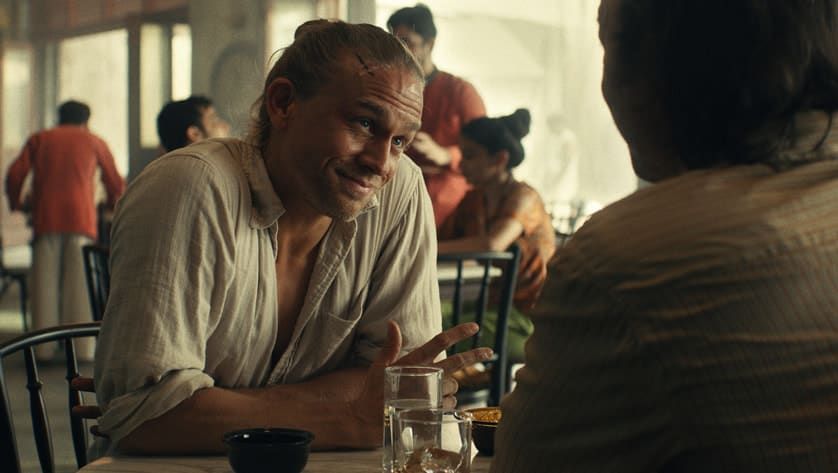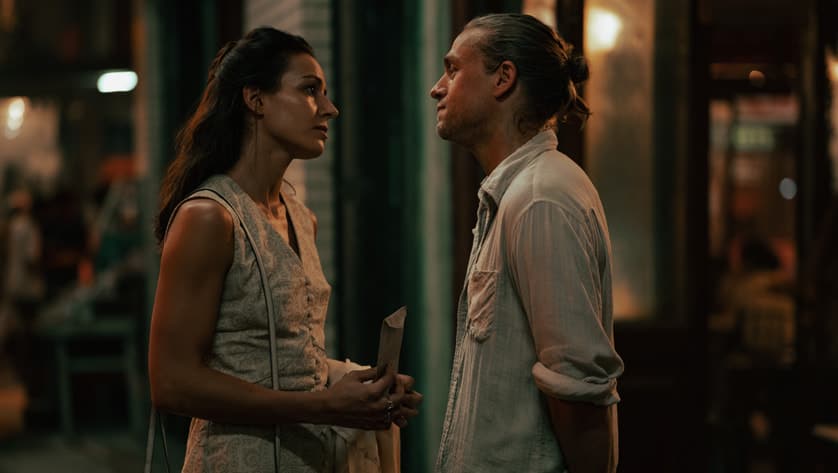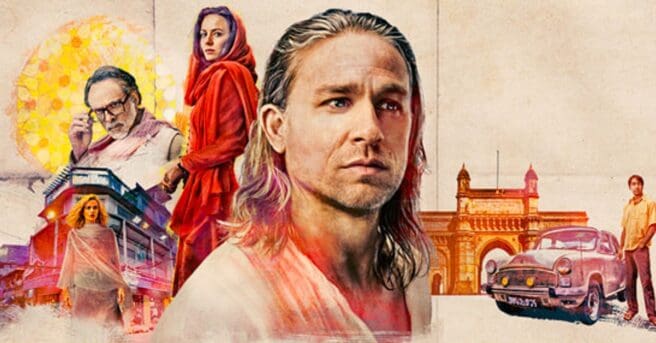Last Updated on October 20, 2022
PLOT: Based on the internationally best-selling novel by Gregory David Roberts, “Shantaram” follows a fugitive named Lin Ford looking to get lost in vibrant and chaotic 1980s Bombay. Alone in an unfamiliar city, Lin struggles to avoid the trouble he’s running from in this new place. After falling for an enigmatic and intriguing woman named Karla, Lin must choose between freedom or love and the complications that come with it.
REVIEW: Since its publication in 2003, Shantaram has been in various states of development with everyone from Johnny Depp and Peter Weir to Mira Nair and Joel Egerton involved. Repurposed from a feature film to a series in 2018 by Apple as one of their first international productions. Led by Charlie Hunnam in his first series role since the end of Sons of Anarchy, Shantaram has gone through a few showrunners and the COVID-19 pandemic before finally making it to screens this month. Thankfully, the epic story inspired by the life of author Gregory David Roberts is a beautifully lush look at a specific era in Indian history with an indelible story about the dark and seedy side of 1980s Bombay with a cast of good-looking actors who embody the source material wonderfully on screen while still keeping the intense grittiness of the tale intact. The problem is that an excellent core story is bogged down by about ten hours of unnecessary storytelling.

With a 900-page novel as the source material, Shantaram should have easily been translated into a limited series format. But, once you get into the first and second episodes, it begins to become apparent that what works on the written page does not work as well in a visual medium. Opening with voice-over narration by Lin (Charlie Hunnam) as he breaks out of an Australian prison where he has been tortured and beaten for his crimes, the story quickly shifts to his exodus under a false identity to India where he intends to “lose himself”. I became instantly intrigued by the world of Bombay, something that Western audiences have explored in films like Lion and Slumdog Millionaire, but here through the lens of an outsider learning how expatriates like the enigmatic Karla (Antonia Desplat) and Lisa (Elektra Kilbey) survive amongst the locals. But, that intrigue slowly turns into monotony as Shantaram comes dangerously close to turning into a white savior story.
As Lin becomes more entrenched in local customs and connects to the criminal underworld of Bombay, his efforts to try and become a member of the local culture while also fighting his own demons echoes countless other movies about a white person venturing to the Far East and discovering themselves while also aiding the indigenous people who cannot save themselves. Luckily, there are good performances throughout Shantaram led by Charlie Hunnam and Antonia Desplat whose relationship anchors the main story of the series. In a supporting capacity, Radhika Apte and Alexander Siddig are excellent with Siddig portraying crime lord Khader Khan. The international cast all do the best with what they can here, the problem is that there is just so much story and much of it just treads water rather than feeling like anything worth investing in.

Told over twelve episodes, Lin’s journey is interspersed with countless voice-overs that sound like the type of self-help quotes you would anticipate from a far less gritty story. I continued to expect something to happen in each episode that would alter the momentum of Lin’s life. As a character, Lin Ford is a man who has made a mess of his prospects by getting involved with the wrong people which led him to prison. Now with a chance to redeem himself, he tends to make the same bad choices over and over again. Thankfully, Charlie Hunnam is a very charismatic actor, and seeing him embody Lin makes you want to root for his success, but as each episode came and went, I kept wondering when the story was going to go somewhere. I am usually all for being faithful to the source material, but Shantaram often feels like it could easily have been trimmed down to six episodes or less and have told a far more propulsive and immediate tale that would have worked far better than this version does.
The issue may have arisen from the shift from one showrunner to another as Shantaram started under the leadership of Eric Warren Singer (American Hustle, Her) before moving to Steve Lightfoot (Hannibal, The Punisher), two very different storytellers. The direction of Shantaram benefits from the visual prowess of Bharat Nalluri along with Iain B. MacDonald and Bronwen Hughes who bring vitality and flair to their depiction of 1980s Bombay that makes it pop on screen as a place that is as alluring as a postcard or travelogue. Despite the seedy underside that is central to this story, Shantaram still looks like an appealing world to inhabit of fully realized characters. From the music to the cinematography, Shantaram looks fantastic.
Shantaram is a novel that has been as popular for those with the itch to travel and explore the world as much as non-fiction works like Into the Wild or Eay Pray Love, but with a much larger and almost Dickensian flair. As epic as the book is, this series doesn’t translate into the same scope. It looks amazing and the cast is well-suited to the material, but the story feels unfocused and unable to sustain the momentum needed to fill this many episodes. I hope those who love the book and have been waiting for this series are satisfied with the adaptation, but I found Shantaram to be overlong and not nearly as engaging as it presents itself to be.
Shantaram premieres on October 14th on AppleTV+.




















Follow the JOBLO MOVIE NETWORK
Follow us on YOUTUBE
Follow ARROW IN THE HEAD
Follow AITH on YOUTUBE